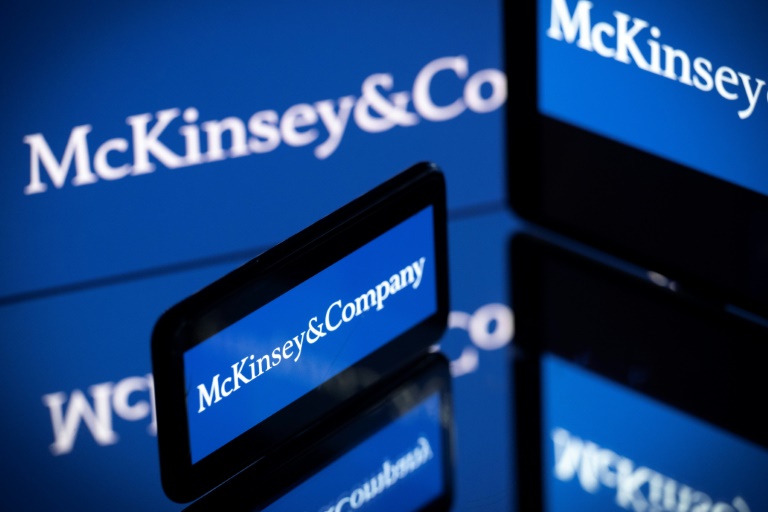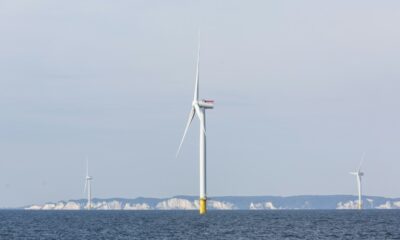The world’s top management consultancy McKinsey & Company is using its position as a key advisor to the UN’s COP28 climate talks to push the interests of its big oil and gas clients, undermining efforts to end the use of the fossil fuels driving global warming, according to multiple sources and leaked documents.
Behind closed doors, the US-based firm has proposed future energy scenarios to the agenda setters of the summit that are at odds with the climate goals it publicly espouses, an AFP investigation has found.
An “energy transition narrative” drafted by the firm and obtained by AFP only reduces oil use by 50 percent by 2050, and calls for trillions in new oil and gas investment per year from now until then.
McKinsey — whose big oil clients range from America’s ExxonMobil to Saudi Arabia’s state-run Aramco — is one of several consultancies giving free advice to the United Arab Emirates as it hosts the critical negotiations, which start on November 30.
Controversially, the talks are being presided over by Sultan Al Jaber, head of the Emirati state oil firm ADNOC.
With scientists saying 2023 is certain to be the hottest year on record, and greenhouse gas emissions headed for unprecedented levels, McKinsey is “vocally and brazenly calling for lower levels of ambition on oil phase-out at the highest levels within the COP28 presidency,” said a source who was in the room on confidential discussions with the summit hosts.
McKinsey responded insisting that “sustainability is a mission-critical priority” and that it is committed to helping clients decarbonise.
“We are proud to be supporting COP28 by providing strategic insight and analysis, and sectoral and technical expertise,” it told AFP.
– ‘Written by oil industry for oil industry’ –
Some of McKinsey’s rival consultancies operating in Dubai have worked in the spirit of finding genuine climate solutions, according to three sources who have taken part in high-level preparatory meetings, who asked not to be named as the proceedings were confidential.
“But it was very clear from an early stage that McKinsey had a conflict of interest,” said a source who took part in COP28 presidency discussions.
“They would give advice at the highest levels that was not in the best interest of the COP president as the leader of a multilateral climate agreement, but in the best interest of the COP president as the CEO of one of the region’s biggest oil and gas companies.”
Confidential documents seen by AFP back this up.
The McKinsey energy scenario for the COP28 presidency “reads as if it was written by the oil industry for the oil industry”, said Kingsmill Bond, a top equity expert who analysed it.
“This is clearly not a credible pathway to net zero,” Bond, a senior principal at the Rocky Mountain Institute think tank, told AFP.
A COP28 spokesman confirmed to AFP that “McKinsey supports COP28 through providing insights and analysis on a pro bono basis.” But to say the firm presented scenarios incompatible with global climate targets “is just incorrect”, he added.
– At odds with net zero –
Structured like a law firm, McKinsey employs some 35,000 people worldwide, including 2,500 partners and 700 semi-autonomous senior partners, with revenue last year reported at about $15 billion.
The 2015 Paris Agreement calls on nations to cap warming at 1.5 degrees Celsius, and the UN’s scientific advisory body has said the world economy must be carbon-neutral by 2050 to stay below that.
But analysts said the pathway McKinsey suggested to Jaber for the COP talks would allow fossil fuel firms to continue to pump way too much oil and gas to hit “net zero”.
“On average, 40-50 MMb/d (millions of barrels per day) of oil is still expected to be utilized in 2050,” compared to about 100 MMb/d today, McKinsey’s narrative said.
That is twice the amount allowed in the International Energy Agency (IEA) net zero roadmap, said Jim Williams of the University of San Francisco, a top modeller of decarbonisation trajectories.
The IEA says CO2-removal technologies must scale up 100,000-fold by 2050 to stay on track for a net zero world — a mind-boggling challenge with no guarantee of success.
But the McKinsey scenario would likely require at least double that, experts said.
“It must involve either far more massive levels of negative emissions technologies” that pull CO2 out of the air, “or an even faster phase out of coal and gas”, said former BP geologist Mike Coffin, head of the Oil, Gas and Mining team at Carbon Tracker.
– Oil demand to peak –
McKinsey’s draft for COP28 says $2.7 trillion a year in new investment will have to be sunk into oil and gas until mid-century, clashing head-on with the IEA net-zero blueprint.
“Even with the current situation and no additional climate policies, we expect that global oil demand will peak in this decade,” said IEA Executive Director Fatih Birol.
Many oil and gas majors — buoyed by high prices and profits in the wake of the war in Ukraine — have backed off commitments to transition to renewables or, in some cases, doubled down on their core business.
“We will stay anchored in what we know we’re good at,” ExxonMobil CEO Darren Woods told McKinsey in an interview published on the firm’s website in September, explaining why his company steered clear of wind and solar power.
– Internal revolt –
In 2021, McKinsey’s work for fossil fuel clients sparked a rebellion within its own ranks.
More than 1,100 of the firm’s employees signed an internal letter seen by AFP warning that “there is significant risk to McKinsey and our values from pursuing the current course.”
“Our inaction on (or perhaps assistance with) client emissions poses serious risk to our reputation” and “our client relationships”, they wrote.
“We have been telling the world to be bold and align to a 1.5C emissions pathway; it is long overdue that we take our own advice.”
McKinsey told AFP that the firm has committed to help clients reach the 2050 net zero target and this means engaging with “high-emitting sectors”.
“Walking away from these sectors would do nothing to solve the climate challenge,” it added.
– ‘We need consultancies’ –
As global warming accelerates, many companies are hiring consultancies to prepare for climate-related risks and opportunities.
“We do need the consultancies to help because we’ve got to get going and move very quickly,” said Bob Ward of the Grantham Research Institute on Climate Change and the Environment at the London School of Economics.
“But it’s essential that they actively work for the transition rather than trying to slow it down because of the vested interests of incumbents, such as the fossil fuel industry.”
The big players — McKinsey, Boston Consulting Group and Bain — hire top graduates on six-figure salaries to draw up plans for clients.
A 2022 McKinsey document promoting private carbon markets seen by AFP identified several of its important clients, including oil firms Chevron and BP, power firm Drax, and mining giant Rio Tinto.
The world’s largest oil company, Aramco, declined to comment when asked by AFP about its relationship to the firm.
McKinsey says it has helped healthcare industry clients develop solar capacity, wind energy providers to become more competitive, and at least one developing country to source more electricity with renewables, but does not name the clients.
“If we want to ensure a managed decline of fossil fuel production, we can’t do so if those helping (companies) make money from fossil fuel production continue to have a seat around the table,” Pascoe Sabido, a researcher at the Corporate Europe Observatory think tank, told AFP.
He said there was a regulatory “blind spot” over consultancies’ role in handling the climate crisis.
“The lobbying and the fixing that happens under the radar… is much more dangerous because there’s much less accountability.”
– ‘Gas and oil consultancy’ –
McKinsey has weathered tough headlines over recent years.
It was forced to pay out hundreds of millions of dollars over the past two years to settle lawsuits after being accused of fuelling an opioid overdose epidemic by advising drug companies. McKinsey denied any wrongdoing.
Multiple investigations have shown that oil and gas giants were aware of the likely trajectory and impacts of global warming as early as the 1970s based on research by their own scientists, while at the same time sowing doubt on climate science that had come to the same conclusion.
McKinsey is “capable of doing good work helping clients navigate the energy transition, but that work pales in comparison to what it is doing for oil and gas,” said one former McKinsey consultant, who asked not to be named due to a non-disclosure agreement.
“They serve the world’s largest polluters,” he argued. “The firm is best understood as possibly the most powerful oil and gas consulting firm on the planet posturing as a sustainability firm, advising polluting clients on any opportunity to preserve the status quo.”

 Business4 months ago
Business4 months ago
 Business5 months ago
Business5 months ago
 Events3 months ago
Events3 months ago
 People4 months ago
People4 months ago
 Events6 months ago
Events6 months ago
















